必4 unit3 语法知识
仁爱英语七年级上册U4T3知识点

仁爱英语七年级上册U4T3知识点在仁爱英语七年级上册的第四单元第三课,我们学习了一些重要的知识点。
这些知识点是我们学好英语的基础,所以我们要认真学习和掌握。
下面是这些知识点的详细介绍。
1. 动词的时态
在英语中,动词的时态分为三种:现在时、过去时和将来时。
现在时表示现在正在进行或经常发生的事情;过去时表示过去已经发生过的事情;将来时则表示将来将要发生的事情。
我们要学会根据句子的语境和时态去使用正确的动词时态。
2. 数词的用法
数词在英语中有两种,分别是基数词和序数词。
基数词用于表示数量,而序数词则用于表示顺序。
我们要根据具体情况正确地使用这两种数词。
3. 形容词的比较级和最高级
形容词的比较级和最高级分别用于表示两个或多个事物之间的比较和最高程度。
比较级通常使用“-er”或“more”来构成,而最高级则使用“-est”或“most”来构成。
4. 祈使句的用法
祈使句用于表示请求、命令等,这种句子的语气比较强硬。
我们要熟练掌握祈使句的用法,根据具体情况正确地使用祈使句。
5. 代词的用法
代词是用来代替名词的,常见的代词有人称代词、指示代词和不定代词等。
我们要认真学习代词的用法,熟练掌握它们的用法和区别。
6. 物主代词的用法
物主代词是用来表示所属关系的,常见的物主代词有“my”、“your”、“his”、“her”等。
我们要认真学习物主代词的用法,熟练掌握它们的用法和区别。
以上就是本课的重点知识点,我们要认真学习和掌握。
只有强化基础,才能在英语学习的道路上越走越远。
Unit 3-4 语法汇总讲义-高中英语新人教版(2019)必修第一册

高中英语必修一语法汇总Unit 3:附加疑问句一、附加疑问句的定义附加疑问句,又称反义疑问句,主要用于口语,其作用是说话人向对方验证自己的陈述或者判断,也可以用于祈使句表示请求或者建议。
二、附加疑问句的构成附加疑问句包括陈述部分和附加疑问部分。
附加疑问部分一般由助动词、be 动词或情态动词和表示主语的代词构成。
组成例句肯定式陈述部分+否定附加疑问部分You often play badminton, don't you?You're going to the gym with me, aren't you?否定式陈述部分+肯定附加疑问部分It's not a real sport, is it?They can't finish it by Friday, can they?含有否定词的陈述部分+肯定附加疑问部分Nobody saw him walk into the room, did they?You've never been to Paris, have you?祈使句+附加疑问部分Come along with me, will you?/can you?/won't you?/can't you?Don't make any noise, will you?附加疑问句的答语与一般疑问句类似,注意其与汉语表达习惯的差异。
如:(1)A:The29th Olympic Games were held in Beijing,weren't they?B:Yes,they were.(Yes, that's right.)(2)A:MichaelJordan started to play basketball in college, didn't he?B:No,he didn't. He first played in a team in senior high school.(3)A:Davidhas been to a boxing match, hasn't he?B:No,he hasn't. He always watches boxing on TV.(4)A:Youcan't cook, can you?你不会做饭,是吗?B:Yes,I can. I'm good at cooking.不,我会。
初一(七年级)下册英语知识点:unit3-unit4
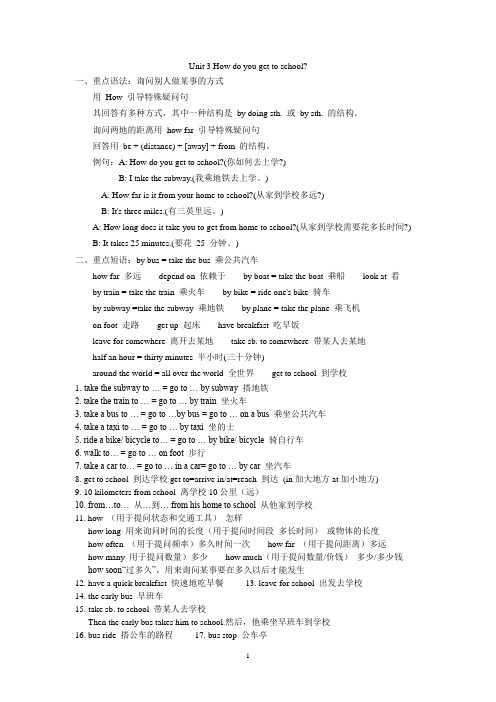
Unit 3 How do you get to school?一、重点语法:询问别人做某事的方式用How 引导特殊疑问句其回答有多种方式,其中一种结构是by doing sth. 或by sth. 的结构。
询问两地的距离用how far 引导特殊疑问句回答用be + (distance) + [away] + from 的结构。
例句:A: How do you get to school?(你如何去上学?)B: I take the subway.(我乘地铁去上学。
)A: How far is it from your home to school?(从家到学校多远?)B: It's three miles.(有三英里远。
)A: How long does it take you to get from home to school?(从家到学校需要花多长时间?) B: It takes 25 minutes.(要花25 分钟。
)二、重点短语:by bus = take the bus 乘公共汽车how far 多远depend on 依赖于by boat = take the boat 乘船look at 看by train = take the train 乘火车by bike = ride one's bike 骑车by subway =take the subway 乘地铁by plane = take the plane 乘飞机on foot 走路get up 起床have breakfast 吃早饭leave for somewhere 离开去某地take sb. to somewhere 带某人去某地half an hour = thirty minutes 半小时(三十分钟)around the world = all over the world 全世界get to school 到学校1.take the subway to … = go to … by subway 搭地铁2. take the train to … = go to … by train 坐火车3. take a bus to … = go to …by bus = go to … on a bus 乘坐公共汽车4. take a taxi to … = go to … by taxi 坐的士5. ride a bike/ bicycle to… = go to … by bike/ bicycle 骑自行车6. walk to… = go to … on foot 步行7. take a car to… = go to … in a car= go to … by car 坐汽车8. get to school 到达学校get to=arrive in/at=reach 到达(in加大地方at加小地方)9. 10 kilometers from school 离学校10公里(远)10. from…to… 从…到… from his home to school 从他家到学校11. how (用于提问状态和交通工具)怎样how long 用来询问时间的长度(用于提问时间段多长时间)或物体的长度how often (用于提问频率)多久时间一次how far (用于提问距离)多远how many 用于提问数量)多少how much(用于提问数量/价钱)多少/多少钱how soon“过多久”,用来询问某事要在多久以后才能发生12. have a quick breakfast 快速地吃早餐13. leave for school 出发去学校14. the early bus 早班车15.take sb. to school 带某人去学校Then the early bus takes him to school.然后,他乘坐早班车到学校16. bus ride 搭公车的路程17. bus stop 公车亭18. bus station 公车站bus stop 是指小站,bus station指大的站,比如汽车站。
2019外研版高中英语选择性必修四Unit3 Using language grammar教案

Book 7 Unit 3 Period 3
Using language
(40分钟)
课型:语法-状语从句复习
主题:人与社会—社会发展与人类文明
内容分析:
本单元大观念: 着眼中外文化交流,立足于中国本土文化,从不同的视角理解中国文化和中国文明,从更广阔的角度探讨中国如何更好地走向世界。
本课为单元第三课时语法。
该部分的主要内容为状语从句的复习。
这部分要求学生在分析典型例句的基础上,补全一个关于大提琴演奏家马友友的小语段,之后再运用状语从句讲述中国高铁的发展,并完成相应的开放性练习。
学情分析:
高二学生已具备在阅读中获取细节信息的能力,部分学生能用英语自信地表达观点。
学生之前也学习过状语从句,对状语从句有一定的了解,但此前与之相关的知识结构并不系统。
学生可能了解了如今中国发明的国际影响力,但缺乏相关信息的英文输入。
教学目标:
在本节课结束后,学生应该能够:
1.理解并总结状语从句的类型和意义,区分不同种类的状语从句;
2.在真实语境中使用状语从句,创造性地完成开放性问题;
3.为中国文化和科技为世界做出的贡献感到自豪,激发努力学习建设祖国的爱
国热情和民族自豪感。
教学重点:
1.引导学生复习状语从句的特点,在真实语境中使用状语从句。
2.引导学生理解中国在文化和技术方面对世界做出的贡献,锻炼语言表达能力。
教学难点:
引导学生在真实语境中使用状语从句
Teaching procedures。
高中英语必修四Unit3知识归纳

Unit3知识归纳词汇1.content n.内容,题材;容量,目录(pl.);满足(意) adj.满足的,高兴的(一般不用作定语);甘愿的vt.使……满足归纳拓展(1)be content to do sth.=be willing to do sth.=be ready to do sth.愿意做某事(不能用contented 替换)be content that满意……feel/be content with...(=feel/be satisfied with)对……感到满意/满足(2)content sb./oneself with sth.使……满足于某事(3)with content满足(意)地to one's heart's content尽情地,心满意足地(4)contented adj.满足的,满意的(可作定语)the contented people满足的人们a contented smile满足的微笑注意:content用作形容词充当表语,表示“非常满意”时,只能说be well content,不能说be very content。
同类辨析content与contented这两个词都有“满意的,满足的”之意。
(1)content表示“甘心的,甘愿的”,多用作表语、后置定语或状语,后面可接不定式。
(2)contented 指安于现状,别无他求,有“知足”的意思,一般作前置定语或表语。
2.entertain vt.&vi.使快乐;款待,招待归纳拓展(1)entertain sb.to sth.用……宴客/招待/款待某人(尤指在自己家中)entertain sb.with sth.=sb.be entertained with sth.用……使某人快乐entertain sb.as...把某人当……招待(2)entertainment n.娱乐活动;款待,招待find entertainment in以……为乐give an entertainment to sb.招待某人give a farewell entertainment to sb.为某人举行欢送会(3)entertaining adj.愉快的,有趣的,引人发笑的entertainer n.款待者;表演娱乐节目的人3.convince vt. 使确信;使信服归纳拓展(1)convince sb.of sth./that使某人相信某事convince sb.to do sth.说服某人做某事归纳拓展(2)convinced adj. 坚定不移的;确信的be convinced of sth./that确信(3)convincing adj. 令人信服的;有说服力的a convincing victory/win大比分获胜同类辨析convince与persuadeconvince和persuade都有“说服”之意,都可用于convince/persuade sb.of sth.和convince/persuade sb.that...结构。
仁爱版八年级英语上册Unit4Topic3【吃透语法】宾语补足语

【吃透语法】宾语补足语本话题重点语法项目——宾语补足语宾语补足语是补充宾语的成分,通常置于宾语之后。
宾语和宾语补足语共同构成复合宾语。
可以用作宾语补足语的有名词短语、形容词短语、介词短语、不定式短语和分词短语等。
1.名词短语作宾语补足语。
如:He called it Mickey Mouse.他把它叫做米老鼠。
We are making our school a beautiful garden. 我们正努力使校园变成一个美丽的花园。
2.形容词短语用作宾语补足语。
如:The Internet makes the world smaller. 互联网使世界变得小了。
The news made her sad.这消息使她感到悲伤。
3. 副词短语用作宾语补足语。
如:Put them away, please.请把它们收起来。
Don’t leave with lights on. 离开时请关灯。
4. 介词短语用作宾语补足语。
如:She found the dog under the table. 她发现狗在桌子下面。
5.动词不定式短语用作宾语补足语。
如:She wants you to call her back soon. 她想让你马上回电话。
I prefer him not to come.我宁愿他不来。
注:有些动词如feel, see, hear, watch, make, let, have等用不带to的不定式或不定式短语作宾语补足语。
如:A special language makes computers talk with each other. 一种专门的语言使电脑之间能相互通话。
6. 分词短语用作宾语补足语。
如:I can hear someone coming.我听到有人来了。
I found all the windows broken.我发现所有的窗户都破了。
巧学妙记巧记宾语补足语的用法宾补即是(足)宾语,通常置于宾语后;名、形、介、副均可用,分词亦可作宾补;不定式,要带to,有些动词to可省;看到(see)注视(watch)有(have)感觉(feel),听到(hear)使(make)让(let)真特殊。
Unit 3-4adj adv 语法总结

二不规则: good/well- better– best bad/badly—worse—worst many/much---more—most little—less—least far—farther---farthest
一原级用法 与 …….一样: …as adj/adv原级as… 与……….不一样……not as/so…. as…. A is as funny as B.--- A isn’t as funny as B. A works as hard as B. A doesn’t as hard as B friendly run fast outgoing jump high hardworking work hard lazy get up late (修饰原级的词:very/so/truly/quite/) 二 比较级用法:1) A or B 2)比较级句型结构: A: adj.比较级+ than…( A is taller than B )--….-A isn’t taller than B.
1.Hainan is a very large Island .It is the largest second _________ island in china. (large) the most careful among us. (careful) 2.He is ______________ the hottest 3.I think Yao Ming is one of ____________ basketball players in NBA. (hot)
Adj/adv : 原级/比较级/最高级 Adj/adv 比较级及最高级构成(一归变) 1. 一般情况在 short----shorter-shortest
七年级上册英语知识点:unit3-unit4

七年级上册英语知识点:unit3-unit4词汇:1.称呼类词汇:sister 姐;妹 mother妈妈father爸爸brother兄;弟grandmother祖母;外祖母grandfather祖父;外祖父aunt姑母;伯母;婶母uncle叔;伯;舅;姨夫son 儿子 cousin表(堂)兄弟(姐妹) daughter女儿2. 本单元出现的缩写:thats = that is hes = he is3. 本单元出现的指示代词:these 这些 those 那些4. thanks for 为,而感谢句式:1. This/that/These+ be动词+ sbs This is his sister. That is my brother. These are his brother.2. be动词+代词+Is this your sister? Is she your sister?3. Thanks for Thanks for the photo of your family.4. Here +be 动词+ Here is my family photo.Is she your sister? No, she isnt.2,This is my friend. These are my friends.That is my brother. Those are my brothers.3, Thanks for the photo of your family. Here is my family photo.photo of your family = your family photo 语法:可数名词单数变复数:一般情况下加s,book-books,以s, x, sh, ch结尾的加eswatch-watches 以辅音字母加y结尾的,把y改为i 再加es boy- boys, family-families 以o结尾的有生命的加es, 无生命的加s, tomato-tomatoes, photo-photos Unit 4 Wheres my backpack?词汇:1.本单元出现的家具类词汇:table桌子 bed床bookcase书橱,书柜 sofa沙发 chair椅子 drawer抽屉2.表位置的介词短语:under the table在桌子下面on the sofa在沙发上in the backpack在双肩背包里 under the bed在床下面 on the chair在椅子上 on the dresser 在梳妆台上on the table在桌子上 in the drawer在抽屉里 on the floor在地板上3.math book数学书4.alarm clock闹钟puter game电脑游戏6.video tape录像带7.take sth. to sb.把某物带给某人take these things to your sister把这些东西带给你姐姐8.ID card身份证9.bring sth. to some place把某物到给某地bring some things to school把一些物品带到学校10.pencil case铅笔盒11.in the bedroom在卧室12.in the kitchen在厨房句型:Wheres the baseball? Its in the backpack.Wheres my computer game? Its under the bed.Where are his keys? Theyre on the dresser.Where are your books? Theyre on the chair.Where are her keys? Theyre on the table.Where are you? Im at school.Is it on the dresser? No, it isnt.Please take these things to your sister.Can you bring some things to school?The book is on the floor.语法: 1,询问人或物品在哪里,我们用Where, 结构为 where+is/are+人/物品名称? “,在哪里” 回答用主语+is/are +in/at/under/on/near +地点注意:表示“在,地方”地点前要用定冠词the 或者形容词性物主代词my/your/his/their修饰,但是两者不能同时出现,我们可以说in the room, in my room 但是绝对不可以in the my room.词语用法:1, take v.带走,把人或物品带到别的地方去,take to 把,带到,去bring v.带来,把人或物品从别的地方带到说话的地方来 bringto 把,带到,来2,please 后接动词用原形。
Unit3-Unit4课文语法填空+课文原句翻译外研版必修第三册

外研版必修第三册unit3+unit4课文语法填空+课文原句翻译unit3Ⅰ.After reading the passage,please fill in the following blanks.Dr Richard Fairhurst,1._______ new book The Ne w Age of In v ention has just been published,has been interviewed.The following is what he tells us.There have been golden ages of invention throughout history.In Ancient China,there 2.________(be) the four great inventions:gunpowder,papermaking,printing and the compass.They changed the world forever.And now we are in the great new age of technology,when most of the new great 3._________(invention) are tech-based.For example,advances in virtual 4._________(real),wearable tech and the flexible battery have been made.5._______ addition,important advances 6._________(make) in medicine and environmental science thanks to increasing computer power.New inventions like 3D printers have been used to make replacement hearts and bone parts.What’s more,it’s possible 7.________(create) an intelligent walking house.Most inventions start with 8._________(recognise) a problem that needs 9.___ solution.But what remains 10.________(importance) is that we have an incredible desire to think and create,which is the real spirit of invention.1.whose2.were3. inventions4. reality5. In6. have been made7. to create8. recognising9. a 10.importantⅡ.请快速背诵下列课文原句1.而现在,我们发现自己正处在伟大的科技新时代。
人教 必修4 unit 3V-ing语法

Read the following sentences from the test quickly and pay attention to the –ing form. 宾补 1. You may find it astonishing that Charlie was taught to sing as soon as he could speak and dance as soon as he could walk. 2. His subtle acting made everything entertaining. 宾补
3.
How did the little tramp make a sad situation entertaining? 宾补
4.
The acting is so convincing that it makes you believe that it is one of the best meals he has ever tasted. 表语
1. 2.
3. 5.
4. 6.
eat, eating working doing do looking at doing
定语 Conclusion 7: 单个动词-ing形式作_________放 前面 在被修饰的名词的__________,既可以表示被修饰者 如句1.3 的作用或功能, 如句_______,也可以表示被修饰者 如句 2、4、5 的动作或状态,如句—————— 定语 Conclusion 8:动词-ing短语作________时,放 后面 在所修饰名词的_____,在意思上相当于一个 定语 __________从句,如句6-8.
人教版八年级上英语第3、4单元语法及知识点讲与练

computer games.
A. not play
B. not to play
C. don’t play
D. to not play
2.关于 both 和all: 都有三中词性,代词/副词/形容词;本单元 主要出现的是副词 顺口溜 “实前系助情后”
eg: We are all good students so our teachers all like us.
player that ever played in NBA.
A. tall
B. taller
C. tllest
D. the tallest
5.(13) 25. My grandpa told a good story, but I told a ______ one.
A. good B. better C. best D. worse
( ) You must write carefully my father.
A.as -- as B. so--as C.as---so D. so—so
( ) Duoduo runs very but Yangyang runs even .
A.fast;fast B. faster;fast C.fast;faster D. faster;faaster
5.到达 :
get to=arrive at/in=reach
但reach还有够到意思;抽象到达
( ) We should put some medicine on the
high place where children can’t
.
A. get B. arrive C. reach D. hold
Unit3-Unit4知识点归纳牛津译林版英语八年级上册

U3知识归纳1.主格作主语, 宾格作表语或动词或介词的宾语.He teaches _____(we) Chinese . / I’m waiting for you.(介词的宾语) / It’s me.(宾格做表语)2.三种人称代词并列充当主语时时,顺序为:单数:(二,三,一)——(You, she and I )复数:(一,二,三)——(we , you and they )注::若把责任担,第一人称最当先,(即若做错事时,把第一人称放在最前面.)eg:She and I have been to Beijing .(一般情况)Who broke the window ? I and Mike .(承担责任)3.it 的特殊用法①it可指不知性别的婴儿或不确指性别的人.who is the person over there?— it is the headmaster.②It也可用来表示天气、时间、距离等。
1)天气: How cold it is today!2)时间: It's about eight o'clock.3)距离: It's 200 kilometers from here.③it做形式主语、形式宾语,常用于句型“It’s +adj +(for sb./ of sb.)to do sth”;It takes sb st to do sth. 花费时间做某事1、形容词性物主代词作定语修饰名词,一般不单独使用. eg: My name is Tom.( 形容词性物主代词)2、名词性物主代词,后面不能加名词,名词性物主代词常与of 连用, 如He is a friend of minee.g. Our classroom is as big as ______(they) . / This is a friend of ______(my).名词性物主代词=形容词性物主代词+ 名词(上题中mine=my friends)【练习】用正确的人称代词/物主代词填空1. My aunt is a teacher. _______ is nice to her students.2. Tom and I are in the same school, but _______ aren’t in the same class.3. —Hi, David. How are _______ ? —Fine, thank you.4. —Here is some news. —Is _______ good?5. David and Kitty go to school together because _______ live near each other.6. My name is Kitty and _______ live in Nanjing.7. Where is your fa ther? I can’t find _______ anywhere.8. Mr. Wu and his students are over there. Now _______ is talking to _______.9. Mr. Gao teaches ________ Maths and we all like _______ lessons.10.Tom and I are good friends._______ often help each other.U4知识归纳一、表示时间的介词at,in,on用法辨析1. in的用法1)用于一天的早、中、晚前。
人教版七年级下册英语Unit 3 --4知识点语法归纳总结
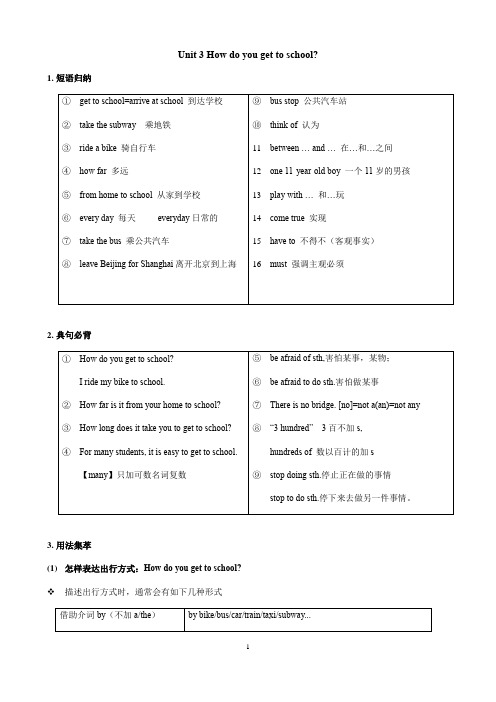
Unit 3 How do you get to school?1.短语归纳2.典句必背3.用法集萃(1)怎样表达出行方式:How do you get to school?❖描述出行方式时,通常会有如下几种形式注意:当交通工具的名词(如:bike, bus, train, car等)和by搭配时,它们前面不必加冠词;但当它们和on或in搭配时,它们之间要加冠词。
(2)基数词的表达法:基数词,表示数目或者数量的多少①one 到twelve,拼写和读音没有什么相似之处,无规律可言,应逐一进行记忆。
②thirteen到nineteen,表示“十几”,在个位数后加后缀-teen,读作/ti:n/。
注意thirteen, fifteen和eighteen的拼写。
③twenty到ninety,表示“几十”,以-ty结尾,但需注意下面几个词的拼写:twenty, thirty, forty, fifty, eighty。
④21~29直到91~99,表示“几十几”,用整十位加个位数表示,中间用连字符“-”把十位数与个位数连接起来。
例:21→twenty-one;35→thirty-five⑤one hundred意为“一百”,表示一百还可以用 a hundred。
要表示200~900,用“具体数字+hundred”。
⑥例:200 →two hundred;900→ nine hundred注意:❖hundred前面若有具体的数词,则要用hundred的单数形式,而且其后不能跟of,此时表达确切的数字概念。
例:There are two hundred people in the square. 广场上有两百人❖hundreds of表示“数以百计的”,此时表达模糊的数字概念。
如:There are hundreds of people in the square. 广场上有好几百人(3)How far is it from your home to school?❖from ... to ... 意为“从...到...”,表示“由一点到另一点”,可用于时间、地点、数目等。
高中英语Unit3 SectionⅢGrammar__被动语态教案含解析牛津译林版必修4

Section ⅢGrammar——被动语态一、基本概念英语中动词有主动语态(Active Voice)和被动语态(Passive Voice)之分。
如果主语是动作或状态的发出者,动词就用主动语态;如果主语是动作或状态的承受者,动词就用被动语态。
Our English teacher encouraged Mary.我们英语老师鼓励了玛丽。
Mary was encouraged by our English teacher.玛丽受到了我们英语老师的鼓励。
上面第一句中的动词encouraged是主动语态;第二句中的动词was encouraged是被动语态。
二、被动语态的基本构成形式被动语态的基本结构是:“be/get+及物动词的过去分词”。
被动语态的谓语动词有各种时态变化,以动词take为例,其常见时态的被动形式如下表:残疾人在我们国家受到尊敬。
Tom's legs were badly injured in an accident last year.在去年的一次事故中,汤姆的双腿严重受伤。
A presentation will be given on the new products.将会有一场关于新产品的介绍会。
Besides,many sea creatures are being wiped out by fishing boats.此外,大量的海洋生物正被捕捞船赶尽杀绝。
The advantages and disadvantages of this machine were being discussed when I went into the meeting room.当我走进会议室的时候,这台机器的优缺点正在被讨论。
The news would be sent to the soldier's mother as soon as it arrived.那个消息一到就会被传达给那个士兵的妈妈。
人教版高中英语必修四Unit3 Life in the future课文全解(常考单词、高频短语和写作句式)
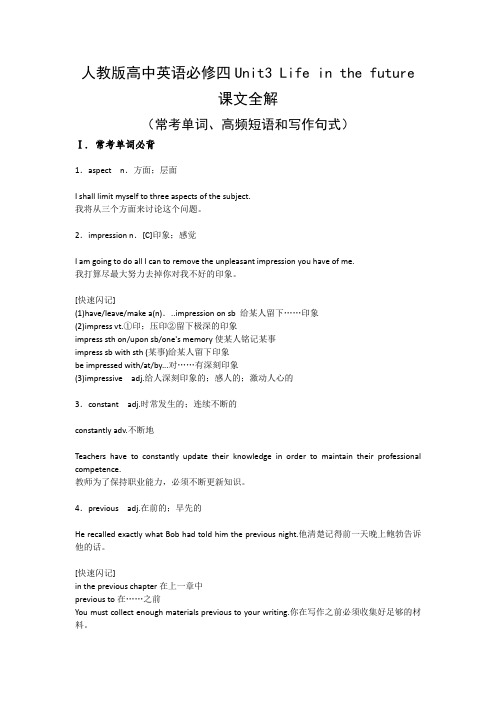
人教版高中英语必修四Unit3 Life in the future课文全解(常考单词、高频短语和写作句式)Ⅰ. 常考单词必背1.aspect n.方面;层面I shall limit myself to three aspects of the subject.我将从三个方面来讨论这个问题。
2.impression n.[C]印象;感觉I am going to do all I can to remove the unpleasant impression you have of me.我打算尽最大努力去掉你对我不好的印象。
[快速闪记](1)have/leave/make a(n)...impression on sb 给某人留下……印象(2)impress vt.①印;压印②留下极深的印象impress sth on/upon sb/one's memory使某人铭记某事impress sb with sth (某事)给某人留下印象be impressed with/at/by...对……有深刻印象(3)impressive adj.给人深刻印象的;感人的;激动人心的3.constant adj.时常发生的;连续不断的constantly adv.不断地Teachers have to constantly update their knowledge in order to maintain their professional competence.教师为了保持职业能力,必须不断更新知识。
4.previous adj.在前的;早先的He recalled exactly what Bob had told him the previous night.他清楚记得前一天晚上鲍勃告诉他的话。
[快速闪记]in the previous chapter在上一章中previous to在……之前You must collect enough materials previous to your writing.你在写作之前必须收集好足够的材料。
人教版英语必修四课件:Unit+3+A+taste+of+English+humour语法专题课
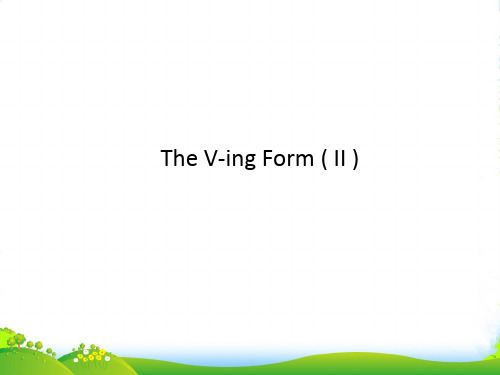
entertaining. S3: How did the little tramp make a sad situation entertaining?
补足 语
S4: The acting is so convincing that it
Consolidation:
Pick out the errors and correct them. 1.We are all fond of Charlie’s early films, which we think are more intereted . 2. Charlie’s job was entertain people, wasn’t it? 3. Charlie’s nonverbal humour often makes people bursting into laughter. 4. I saw the boys climb the fence when I passed. 5.All the stuff in our company are considering to go to the city centre for the fashion show. 6.I wouldn’t mind to see The Gold Rush again with you tonight. 7.The meeting to be held now is very important. Suggesred answers:1.interested → interesting 2.entertain→ entertaining 3.bursting→burst 4.climb → climbing 5.to go → going 6.to see → seeing 7. to be held → being held
选择性必修四Unit3重点语法讲解—动词不定式总复习
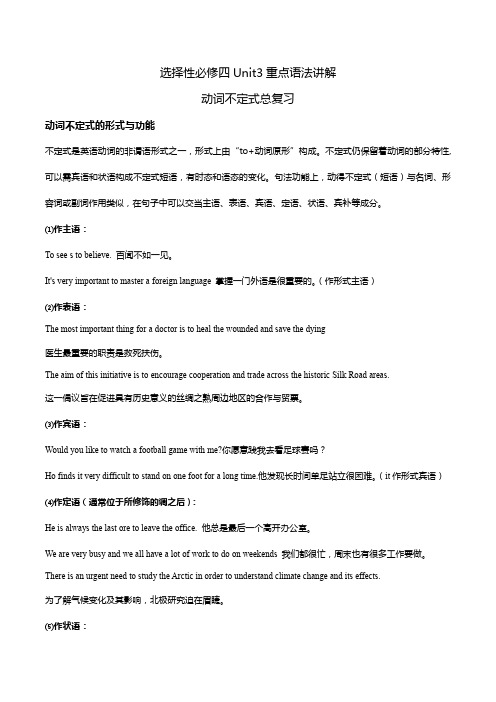
选择性必修四Unit3重点语法讲解动词不定式总复习动词不定式的形式与功能不定式是英语动词的非谓语形式之一,形式上由“to+动词原形”构成。
不定式仍保留着动词的部分特性,可以需宾语和状语构成不定式短语,有时态和语态的变化。
句法功能上,动得不定式(短语)与名词、形容词或副词作用类似,在句子中可以交当主语、表语、宾语、定语、状语、宾补等成分。
⑴作主语:To see s to believe. 百闻不如一见。
It's very important to master a foreign language 掌握一门外语是很重要的。
(作形式主语)⑵作表语:The most important thing for a doctor is to heal the wounded and save the dying医生最重要的职责是救死扶伤。
The aim of this initiative is to encourage cooperation and trade across the historic Silk Road areas.这一偶议旨在促进具有历史意义的丝绸之熟周边地区的合作与贸票。
⑶作宾语:Would you like to watch a football game with me?你愿意践我去看足球赛吗?Ho finds it very difficult to stand on one foot for a long time.他发现长时间单足站立很困难。
(it作形式宾语)⑷作定语(通常位于所修饰的调之后):He is always the last ore to leave the office. 他总是最后一个高开办公室。
We are very busy and we all have a lot of work to do on weekends 我们都很忙,周末也有很多工作要做。
人教新课标必修4 Unit 3 语法-ing 形式作定语, 宾语补足语和表语

19
see, hear, feel, watch等动词之后用-ing形式和
动词不定式作宾语补足语的区别:
① 前者表示动作正在进行,而后者表示
(或强调)动作从开始到结束的全过程。如:
We passed by the classmates and saw the teacher making the experiment.
吸烟会致癌。
2019年5月14日星期二
2
3. Walking is my sole exercise.
散步是我唯一的运动。
4. Talking mends no holes.
(谚)空谈无济于事。
5. I suggest bringing the meeting to an end.
我建议结束会议。
entrance.
当我们回到学校时, 发现一个陌生人站 在大门口。
2019年5月14日星期二
15
三、-ing形式作宾语补足语
能用-ing形式作宾语补足语的几类动词: 1) 表示感觉和心理状态的动词,常见的有see, watch, observe, look at, notice, hear, feel, smell等。如: We saw a light burning in the window. I felt somebody patting me on the shoulder. Listen to the birds singing.
(2)①The film we saw last night is moving. ②The present situation is inspiring. ③The book is boring.
八上unit3、unit4知识大盘点——词汇篇 语法篇

Unit3——unit41.熟练掌握两个单元重点词汇、短语、句型。
2.熟练掌握两个单元重点语法点Unit3一、重点词汇1.order n.订货;订购pare v.比较;对比3.monitor n.(计算机)显示器4.speaker n.扬声器5.main unit n.(计算机)主机6.keyboard n.(计算机或打字机的) 键盘7.mouse n. (计算机)鼠标8.type v.打字9.brain n.脑10.control v.操纵,控制(机器或系统等)11.expensive adj.昂贵的;价格高的12.tiny adj. 极小的;微小的13.depend v.依靠;依赖14.﹡calculate v.计算15.speed n.速度16.operate v.操作;控制17.railway n.铁路系统pany n.公司19.price n.价格20.total n.总额;合计21.inch n.英寸22.sell v.(sold, sold)出售;售卖23.popular adj.受喜爱的; 受欢迎二、重点短语work as___________________ (be) unaware of _________________ depend on/upon_____________ in addition_____________________grand total_________________ look forward to doing____________main unit__________________ type/ a type of__________________operate railways_____________ at a faster speed_________________the price of ________________ produce new ideas______________make a phone order__________ in the 1940s___________________a washing machine__________ sth. happens to sb.______________change one's life____________ type in kepwords _______________attend a meeting____________三、重点句型1.Now computers are becoming smaller and better.2.I hope we can all work together to stop students from spending too much time playing computer games.四、语法讲解1.order n.订货,订购May I take your order?可以为您点餐吗?Our school ordered some new computers.Order sb. to do sth. 命令某人做某事The teacher order students to take notes.pare v.比较,对比Please compare the two bags. I have compared the prices in the two shops.Compare A with B 比较A和BPlease compare your handwriting with Tom’s.Compare A to B 把A比作BA teacher’s work is often compared to a candle.3.control1)v.操作,控制This switch controls the lights in the hall.Your brain controls the rest of your body.2)n.控制Under the control在...的控制下out of control失去控制In control of掌控...Lose control 失控4.Operate1) v.操作,控制The expert will come and teach us how to operate the machine.2)v.动手术n. operation...给...动手术The doctor will operate on her leg tomorrow.n.operation手术(可数)5.We can use computers to calculate.use sth to do 用…来做某事sth is used to do sthComputers can be used to calculate.used to do sth 过去常常走某事be used to doing sth 习惯于做某事6.work as从事...工作My father is a doctor.=My father works as a doctor.work的其他短语:workout计算出work for为...效力work on从事于...;继续工作Work with与...共事;对...有效work hard工作努力,学习努力At work在上班hard work努力的工作;艰难的工作7.look forward to盼望,期待We are looking for your reply.(your coming)Look forward to doing(to为介词):盼望做...I’m looking forward to seeing you8.In the 1940s, the first computers were bigger than cars. Now computers are becoming smaller and better.Some computers are tiny. There is probably one inside your TV or washing machine.1)becoming smaller and better. 比较级形式,“变得更小和更好”2)in the 1940s 在20世纪40年代(the) + 年份+ s : 某一世纪的多少年代在19世纪60年代: in the 1860s在二十一世纪: in the twenty-first century在1984年: in 1984 / in the year of 19849. You may be unaware of them.be unaware of未察觉,没意识到eg:He was unaware of the danger.反义短语:be aware of察觉到,意识到eg:He wasn’t aware of the danger.10.You depend on computers more than you realize.depend ondepend on意为“依靠,指望”,主语可以是人,也可以是物,其含义有所不同。
- 1、下载文档前请自行甄别文档内容的完整性,平台不提供额外的编辑、内容补充、找答案等附加服务。
- 2、"仅部分预览"的文档,不可在线预览部分如存在完整性等问题,可反馈申请退款(可完整预览的文档不适用该条件!)。
- 3、如文档侵犯您的权益,请联系客服反馈,我们会尽快为您处理(人工客服工作时间:9:00-18:30)。
Up to now 到现在为止,通常与现在完成时连用; 同义短语so far,by/till/until now。
Eg. ①Up to now, the work has been quite smooth.②I have heard nothing from him __ __ ___ . 迄今为止我没得到他的一点音信。
2. content adj. 满足的,满意的 vt.使满足 n. 满足;含量;内容; 目录;容纳的东西(1)be content to do sth. 乐于做某事be content with. . . 对……满足/满意be content that. . . 对……满足/满意(2)content sb. /oneself with sth. 使某人/自己满足于某事(3)to one’s heart’s content 尽情地Eg. ①He got a new job in a hotel and he was content with it.②She dropped her purse and the contents fell out on the floor.③That rich man is tired of city life,so he is ____ _______ __ ____ in the country.那位富人厌倦了城市生活,于是他很愿意生活在乡下。
④As he had to drive home after the party,he _________ ______ ____ two glasses of beer.由于聚会后要开车回家,所以他只喝了两杯啤酒就心满意足了。
注:content作形容词时,通常作表语、后置定语或状语,作前置定语时要用contented, 如a contented expression满足的表情。
3. astonish vt. 使惊诧(1)be astonished at/by sth. 对某事感到惊讶be astonished to do sth. 吃惊地做某事be astonished that. . . 很惊讶……(2)astonishment n. 惊讶to one’s astonishment 令某人惊讶的是(3)astonished adj. 惊讶的(4)astonishing adj. 令人惊讶的Eg. ①I’ m astonished that he paid so much for the ring.②He was astonished to see his father here.③He ___ _________ __ the news. 他听到这个消息感到很吃惊。
④(用astonish的适当形式填空) To our great ____________ ,the boss wasn’t _________ at the __________ news at all.4.Unfortunately =fortunately =5.①我去他家, 发现他家的生活条件比我家还差。
I went to his home and found his living conditions were ___________ than mine.②The school was then ___________ teachers.当时学校缺少教师。
Well off 富有badly off 贫穷6.By +时间状语7.I don’t think I am ______ ; it is said that ______ is the mother of success.A.a failure; failure B.failure; a failureC.a failure; a failure D.failure; failureFail to do sth.Failure n. 失败者,失败的事(抽象名词)8. entertain vt. & vi. 使欢乐;款待(1)entertain sb. with sth. 用……招待某人;用……使某人快乐entertain sb. (to sth. ) 招待/款待某人(2)entertainment n. 娱乐entertaining adj. 有趣的;娱乐的;使人愉快的.Eg. ①He cut off a bunch of grapes to entertain us.②The child entertained himself with his building blocks.③She was always so funny and entertaining.④Bob and Liz __________ __ __ dinner last night. 昨晚鲍勃与利兹设宴招待了我们。
9.pick out挑出; 辨别出Eg. ①Have you picked out the movie you want to see?②I can pick you out even if you are wearing the same clothes as others.[2010山东, 27]Sam ______ some knowledge of the computer just by watching others working on it.A. brought upB. looked upC. picked up D.set up翻译以下短语pick up _____________________________pick off ___________11. direct vt. & vi. 导演;指示;指挥 adj. 直的;直接的;直率的 adv. 直接地(1)direct sb. to do sth. 指示某人做某事direct sb. to sp. 指引某人去某地direct that-clause 指示,命令……(从句谓语动词用should+动词原形,should可以省略)(2)in the direction of 朝……方向under the direction of 在……指导下in all directions=in every direction 朝四面八方Eg. ①The judge directed that the child (should)be taken good care of by his mother.②He directed many Shakespearian plays in London.③His boss _______ ___ __ cancel the meeting. 他的老板指示他取消这次会议。
12.particular adj. 单独的,特殊的,特定的,个别的,特别的,值得注意的,与众不同的 in particular 特别的particularly adv. 特殊的,特别的be particular about… 对……挑剔,对……讲究special adj. 专门的,特殊的,特别的。
强调的是事物特有的性质、性格或专门的目的、用途。
especial adj. 特别的,主要的,突出的。
强调的是重要性,有“优越、好感”之意。
particular adj. 特别的,讲究的,挑剔的。
强调特定的,个别的,与众不同的。
用适当的词填空:(1) He likes the country, _______ in spring.(2) We came here ________ to see you, our friend.(3) It has been _________ hot this week.(4) It is ____________ fine today.单项填空:(5) It’s always difficult being in a foreign country, _________ if you can’t speak the language.A. extremelyB. naturallyC. basicallyD. especially(6) The fashionable lady is ________ about clothes.A. specialB. particularC. carefulD. strict13. convince vt. 使信服(1)convince sb. of sth. 使某人信服某事convince sb. to do sth. 说服某人做某事convince sb. that 使某人确信……(2)convinced adj. 信服的,相信的convincing adj. 有说服力的,令人信服的be convinced of/that. . . 确信……Eg. ①I managed to convince them that the story was true.②There is now convincing evidence that smoking causes lung cancer.③You need to ________ your interviewer __ your ability to master the work.你需要让你的面试官相信你有驾驭这份工作的能力。
④His mother has been trying to ________ ___ __ ___ a doctor. 他妈妈一直设法说服他去看医生。
⑤(用convince的适当形式填空)His __________ words finally __________ me, and I was __________ that he was innocent. 拓展:“动词+sb. +of sth. ”结构1. remind sb. of sth. (sb. )使某人想起某事(某人)The story reminds me of my past.2. rob sb. of sth. 抢某人某物The robber robbed him of his money.3. rid sb. of sth. 使某人摆脱……You should rid yourself of that bad habit.4. cheat sb. of sth. 骗走某人某物The man cheated the old lady of all her money.5. cure sb. of sth. 治愈某人的疾病, 纠正某人的坏习惯This medicine cured him of his headache.6. tell sb. of sth. 给某人讲述某事He told me of his trouble.7. inform sb. of sth. 通知某人某事He informed me of his safe arrival in the USA.8. warn sb. of sth. 警告某人某事(还可说warn sb. against sth. )We warned him of the danger. 我们警告他有危险。
